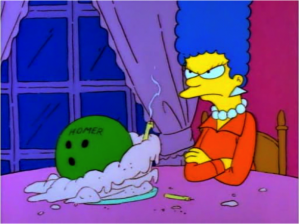It often surprises people to learn that I’ve been in not just one, but several different unhealthy and abusive relationships (and not just in my personal life — I’ve had abusive work situations, too). As an outspoken feminist, an accomplished martial artist, a highly intelligent and university-educated person, and coming from a privileged childhood (so, no poverty-related issues to overcome), it seems on the surface that I’d be the last person to put myself in a position to be abused. But my situation isn’t a unique one, and there are a lot of women out there who come across as strong, confident, and goal-oriented, who wind up in unhealthy relationships — serially. Over and over again. And the question that always comes up when these relationships fall apart and the abuse is exposed to the world is, “why would you ever put up with that?” Because we know that we were being treated wrong. We can identify and discuss the ways in which we were abused. But we stayed anyway, and that’s an incredibly confusing thing — often, even to us. Why did we put up with it?
But we don’t have to look far to see a plethora of examples of just these sorts of unhealthy relationships in media. A popular sitcom trope is that of the beautiful, intelligent, capable woman who is in a relationship with (and continually forgives) a borderline-abusive jerk. Look at Marge & Homer, Peter & Lois, Wilma & Fred, Spike & Buffy, Barney & Robin, Shrek & Fiona, Belle & Prince Adam … you get the idea. The idea of a strong woman supporting and forgiving a weak man (often because he’s “just a man” and doesn’t know any better) is well-established.
The problem is that, like many other women, I’m a fixer. I like to take things that are broken, and make them better. And I don’t give up easily on a “project” I’ve taken on. The traits that make me a fixer are generally considered positive traits, and many of them are traditionally considered “feminine”: I’m a care-giver, a nurturer, a teacher, a healer. I’m also stubborn and independent, which in the context of an abusive relationship means that when trouble comes along, I tend to batten down the hatches and isolate myself while I fix whatever is going on, rather than seeking help from friends or family. I self-isolate, which makes me the perfect target for an abuser.
Another factor that enters in to this equation is a sense of shame. Because I am intelligent enough to recognize what’s going on, I will see the abuse — and try to hide it. I don’t want my intelligent, feminist friends and family to realize that I’ve fucked up and attached myself to another abusive, controlling, life-draining, soul-destroying human being. So when I see abusive behaviours, I’ll recognize in my brain “he’s gaslighting me”, or “he’s telling me how I should feel instead of acknowledging my emotions”, or “did he really just try to bully me into doing that?” … and I’ll hide it. Ashamed that I’ve gotten myself into another such situation, I’ll laugh it off, keep it secret, and try to deal with it behind closed doors, because I know that one of the first questions out of anyone else’s mouth is going to be, “why would you put up with that?” — and I don’t have a good answer.
There’s always a reason why we stay, of course. Love, often. It’s hard to walk away from a person you love — and abusers are master manipulators. They often set it up so that you’ll feel that if you leave, their life will be ruined. It’s hard to take responsibility for destroying someone you care about, and that romantic sense that “you complete me” can quickly become a terrifying trap. But there are more subtle tactics, too. Mental illness, for example, is often used as an excuse for bad behaviours. We tell ourselves things like, “he’s lashing out at me because he can’t cope with his own depression”, instead of recognizing the attacks for what they really are. We tell ourselves that we can’t leave someone who’s mentally ill, that leaving someone who’s sick would be just as bad as leaving someone because they have cancer. But bad behaviour is bad behaviour, and we have to learn eventually to escape from it.
So many campaigns against abuse, these days, are about “awareness”. About teaching us to recognize abuse. But the problem is that simple “awareness” isn’t enough. I knew last November that one of my relationships had turned abusive — it took until the spring before I stopped sleeping with him, and until the end of summer before the shit really hit the fan and I stopped publicly defending his behaviour. I was aware that he was continually gaslighting me, negging me, telling me how I should be feeling, manipulating and controlling my emotions — and when I would try to call him out on it, he’d have a “mental breakdown” and beg me for comfort, beg me to tell him it was okay and that I still loved him. When friends and loved ones told me, “he shouldn’t be treating you like that,” I shrugged it off, even as I mentally agreed with them. But I couldn’t give up on it and live with the consequences of another public, humiliating failure.
We need, as a society, to stop treating abuse victims like they’re stupid. We aren’t stupid. We know what’s going on, and we know it isn’t right. We just don’t know how to end these relationships without being stigmatized. Being cast as a “victim” is bad enough — being cast as a stupid victim who didn’t know what was happening? Is intolerable. The discussion needs to change, because “awareness” is only the first step. After that there’s actually getting out, and getting on with your life, which is where you really need the support.
